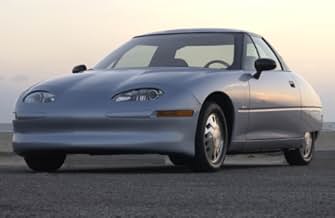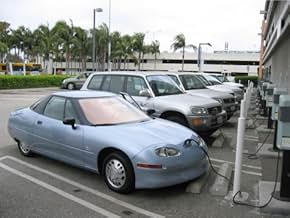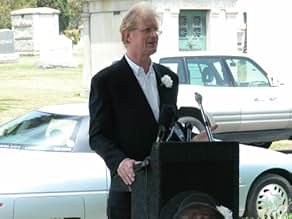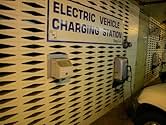IMDb रेटिंग
7.6/10
13 हज़ार
आपकी रेटिंग
अपनी भाषा में प्लॉट जोड़ेंA documentary that investigates the birth and death of the electric car, as well as the role of renewable energy and sustainable living in the future.A documentary that investigates the birth and death of the electric car, as well as the role of renewable energy and sustainable living in the future.A documentary that investigates the birth and death of the electric car, as well as the role of renewable energy and sustainable living in the future.
- पुरस्कार
- 4 कुल नामांकन
Martin Sheen
- Narrator
- (वॉइस)
Reverend Gadget
- Self
- (as Greg 'Gadget' Abbott)
David Freeman
- Self
- (as S. David Freeman)
Frank Gaffney
- Self
- (as Frank J. Gaffney Jr.)
फ़ीचर्ड समीक्षाएं
I'm neither a liberal or a conservative (yes, there are other options!)and while I expected to read the usual 'party lines' concerning the politics of this movie ... I was AMAZED at how many people missed the point of the movie. This wasn't, at its heart, a movie about the politics of energy. Rather, it was a human story about people who found, and even fell in love, with a preferred form of transportation, only to have it taken away from them against their will. ***CAUTION --- POSSIBLE SPOILERS AHEAD*** I don't think what I'm about to say will spoil the movie experience, but I decided to play it safe. The most amazing part of the story, to me, concerns the quiet battle between General Motors and the EV1 lessees who wanted desperately to keep their vehicles. Why did GM take such a hard core approach? It seemed to me a more conciliatory approach would have done the embattled auto-maker a world of good. To me, that was the question that drove the story. Yes, most of the people who apparently leased one of GM's electric cars were celebrities and/or people of some measure of wealth. So what? Anyone who likes electronic gadgetry has heard the expression "early adopter," referring to those with money who purchase state-of-the-art equipment at high prices, thereby fueling the development and investment that pushes products to consumer-level pricing. GM's inability to realize this is what makes the whole story fascinating. I encourage anyone who would, to watch the movie closely, and see If this doesn't ring true. Now, having said my piece about the movie, let me throw some comments about energy policy into the fray. 1) We absolutely, positively need gas to reach a price of $5 a gallon or more. Why? Supply and demand. Only when it HURTS to drive a gas guzzler, will most of us finally get off that doomed bandwagon. 2) We had a solution to coal produced electricity in our laps twenty years ago, and a piece of Hollywood drivel ("The China Syndrome")turned us into weenies. Yes, folks, I mean nuclear power. It CAN and IS producing power safely, and environmentally soundly. Just not here in the U.S., by and large. Finally, 3) Supporting the development of electric-only cars is a viable choice. With the improvements being made in solar panel technology, I suspect a working battery-solar hybrid may be a very real option in the NEAR future. If we avoid the stupidity this movie helps us to understand.
10lise-36
Director Chris Paine is no dummy. As a onetime owner of an electric car (the EV1) and a savvy filmmaker, he has quadruple checked his factsand they are alarming. Although the electric car obviously depends upon coal or oil for its power, electricity is far cleaner than gasoline in the long run with less carbon output. Additionally, the batteries are recyclable, and electric cars make fewer demands in other environmental ways: There are no oil changes, oil filters, spark plugs and other parts and services that conventional autos require. Each of these parts carries its own environmental cost.
See this film. It has nothing to do with the current price of gas and everything to do with corruption on many levels.
See this film. It has nothing to do with the current price of gas and everything to do with corruption on many levels.
I think this movie is wonderful. Can't understand the low rating on this site so far--I really wouldn't be surprised if those individuals and industries who stand to lose profits from the revelations of the movie, have voted negatively to artificially reduce its average rating on this well-known site. I mean, jeez, the movie hasn't even debuted yet (I saw an advanced screening)! And already it's only at a four-something? C'mon! Since I leased and drove an EV daily for three years(until it was rear-ended), I feel I'm in a good position to realistically evaluate the movie. Let's face it, it's a story that needs to be told. These issues impact everyone, since everyone is affected by air quality, unstable foreign politics, gas prices, transportation, and (lack of) consumer choice. EV technology is here, now. Unlike the fuel cell, which is perpetually 10 years in the future. Why was it taken away from the consumers who wanted it? Why does our society not promote the mentality that multiple solutions (EVs, fuel cells, hybrids, bicycles, mass transit, increased fuel economy, etc. etc.) all need to be employed to attack our problems with pollution and dependence on foreign oil? Why are there all these myths that the electric car is undesirable and not viable? Consumers and policy makers need to know this story.
As a driver who lived and followed the story, I think the movie does a bang-up job of revealing it. The movie begins with a historical look at the development of the electric car, what factors discouraged it back then, what brought it back to life in the 1990's, its amazing features, and why it is no longer available to consumers as a production vehicle. (conversion kits only, folks!) The movie is filled with history, politics, technology, innovation, and some very interesting personalities. It's woven together well and is smooth and fascinating. Even though it's a documentary, it will not put you to sleep! Go on--go see it. Even if you don't agree with it, you won't regret it. We all have a responsibility to be more active with these issues, and in the meantime it's a fascinating story.
As a driver who lived and followed the story, I think the movie does a bang-up job of revealing it. The movie begins with a historical look at the development of the electric car, what factors discouraged it back then, what brought it back to life in the 1990's, its amazing features, and why it is no longer available to consumers as a production vehicle. (conversion kits only, folks!) The movie is filled with history, politics, technology, innovation, and some very interesting personalities. It's woven together well and is smooth and fascinating. Even though it's a documentary, it will not put you to sleep! Go on--go see it. Even if you don't agree with it, you won't regret it. We all have a responsibility to be more active with these issues, and in the meantime it's a fascinating story.
How can you fit decades of events into two hours? And, not appear to have an agenda? Mr. Paine and his crew did a good job creating a synopsis of the events affecting the Electric Vehicle, and its subsequent effect on us as a society. He also more clearly outlined why we should pay more attention to the EV, and how it played such a key role in the history of our country.
The main thrust of this movie is to educate the public about the actions of key players in shaping our society through their policies on transportation and energy, and how powerful those policies have proved to be in affecting us as a nation. I came away with a better understanding of what I had only guessed at before, and I am very glad that Mr. Paine chose to give the concern-inspiring events first but leave us with a sense of optimism for the future.
The only fault I can find with this movie is that it necessarily has to cover a lot of factual information, something that makes it a lot like reading a good book, rather than viewing a movie. But, if it makes you take a good look at why we're paying over $3/gallon for gas, then it's a good book indeed.
The main thrust of this movie is to educate the public about the actions of key players in shaping our society through their policies on transportation and energy, and how powerful those policies have proved to be in affecting us as a nation. I came away with a better understanding of what I had only guessed at before, and I am very glad that Mr. Paine chose to give the concern-inspiring events first but leave us with a sense of optimism for the future.
The only fault I can find with this movie is that it necessarily has to cover a lot of factual information, something that makes it a lot like reading a good book, rather than viewing a movie. But, if it makes you take a good look at why we're paying over $3/gallon for gas, then it's a good book indeed.
A look into the anticipated introduction of electric cars in the mid '90s to their mysterious recall a few years later. The documentary talks to former electric car owners, government personnel and others while examining the automobile industry and the laws that around it. All trying to draw a conclusion about why this clean, efficient, sleek yet affordable vehicle was pushed from the market in the midst of global warming and rising gasoline prices.
The film presents an interesting and largely hidden topic. Giving a brief history of the electric car, which interestingly used to be more popular than gasoline based cars (!!!!), it will leave most viewers scratching their head and wanting to know more. The resulting investigation is surprisingly large in scope and encompasses many things from the highest echelons of government right down to average Joe. All in a brisk 91 minutes.
However, the film is not just interesting, it addresses many concerns that have been rising faster and faster for a while now, which makes it also an important documentary. --- 9/10
Rated PG: "brief mild language." That's funny, Jaws, with all of it's terror, gore and death is rated PG too.
The film presents an interesting and largely hidden topic. Giving a brief history of the electric car, which interestingly used to be more popular than gasoline based cars (!!!!), it will leave most viewers scratching their head and wanting to know more. The resulting investigation is surprisingly large in scope and encompasses many things from the highest echelons of government right down to average Joe. All in a brisk 91 minutes.
However, the film is not just interesting, it addresses many concerns that have been rising faster and faster for a while now, which makes it also an important documentary. --- 9/10
Rated PG: "brief mild language." That's funny, Jaws, with all of it's terror, gore and death is rated PG too.
क्या आपको पता है
- ट्रिवियाThe boxy, small EV shown being crushed in the movie was the Honda EV-Plus. They, like the sleek GM EV-1, were only available for lease; several returned to Honda, and were converted into fuel cell demonstration vehicles. For a while, you were able to lease them through EV Rentals (at several Budget Rent a Car locations).
- भाव
Mel Gibson: Who writes the history? Um, well... The guy with the biggest club.
- साउंडट्रैकJane's Theme
from दी थर्टीनथ फ्लोर (1999) (as The 13th Floor)
Composed by Harald Kloser
Courtesy of Centropolis Entertainment
टॉप पसंद
रेटिंग देने के लिए साइन-इन करें और वैयक्तिकृत सुझावों के लिए वॉचलिस्ट करें
- How long is Who Killed the Electric Car??Alexa द्वारा संचालित
विवरण
- रिलीज़ की तारीख़
- कंट्री ऑफ़ ओरिजिन
- भाषा
- इस रूप में भी जाना जाता है
- EV Confidential
- फ़िल्माने की जगहें
- उत्पादन कंपनियां
- IMDbPro पर और कंपनी क्रेडिट देखें
बॉक्स ऑफ़िस
- बजट
- $10,00,000(अनुमानित)
- US और कनाडा में सकल
- $16,78,874
- US और कनाडा में पहले सप्ताह में कुल कमाई
- $45,138
- 2 जुल॰ 2006
- दुनिया भर में सकल
- $17,64,304
- चलने की अवधि1 घंटा 32 मिनट
- रंग
- ध्वनि मिश्रण
- पक्ष अनुपात
- 1.75 : 1
इस पेज में योगदान दें
किसी बदलाव का सुझाव दें या अनुपलब्ध कॉन्टेंट जोड़ें

टॉप गैप
By what name was Who Killed the Electric Car? (2006) officially released in India in English?
जवाब


























